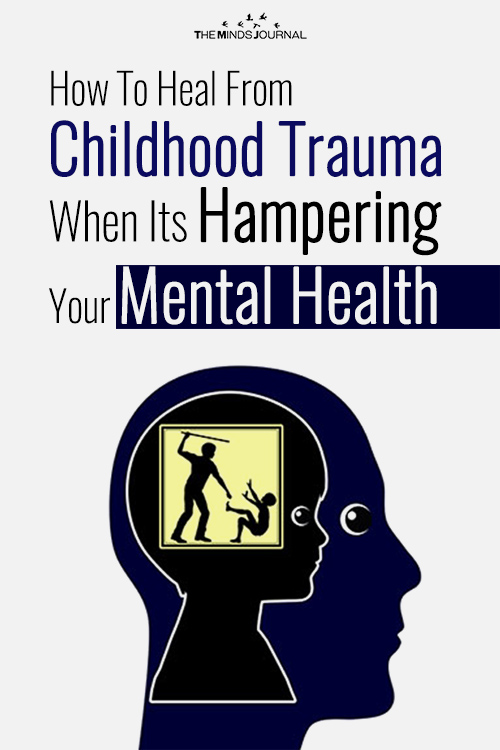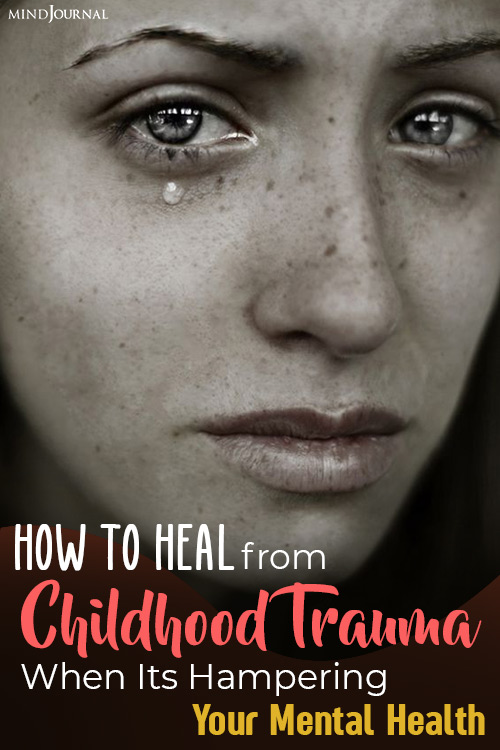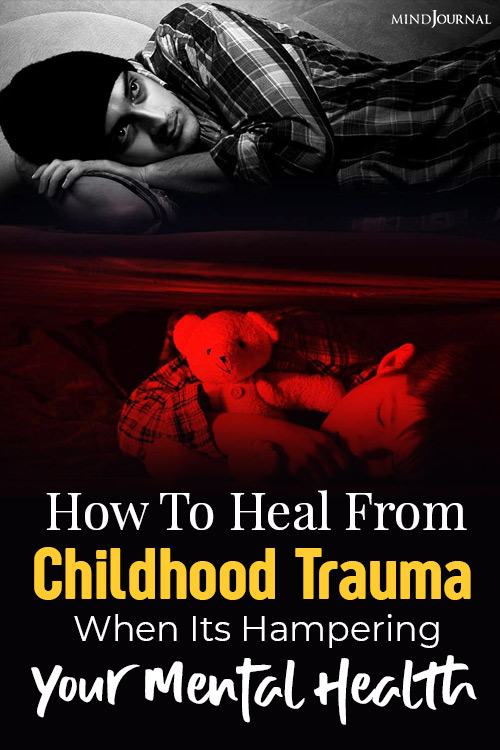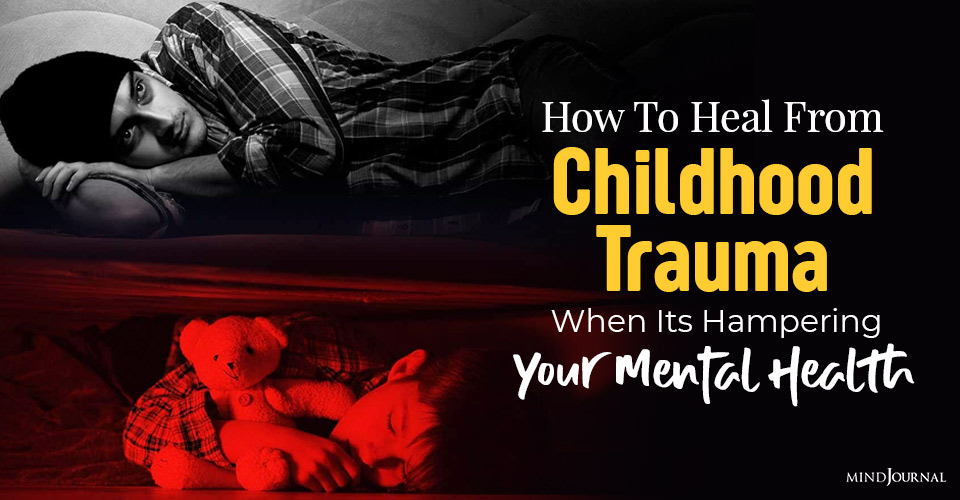Keeping your childhood trauma a secret can make you feel lonely, can lead to psychological symptoms, and unless you embark on a path of healing, can adversely affect your mental health in the long run.
You’ve kept your childhood trauma a secret out of shame and fear. There was no one safe to tell. Now, you don’t know who you can trust. If you open up, you’re afraid of being judged or punished. It’s a lonely way to live and bad for your mental health.
Childhood trauma is devastating, no matter what form it takes. It affects your self-esteem, trust, future relationships, and sense of safety in the world. And, no matter what you do to forget, the secrets haunt you every day.
Related: 8 Reasons Why People Deny Childhood Trauma and Its Results
You know some of the reasons you’ve kept secrets, but is there more? Plus, you wonder, are some of the things you’re struggling with caused by your secrets?
Yes, keeping secrets can cause psychological symptoms and problems.
So, let’s talk about 6 reasons why you might be keeping your childhood trauma a secret, how secrets lead to psychological problems, and what you can do about it now.
You have your own reasons for keeping your trauma a secret. Everyone is different and trauma affects each child in a unique way. Yet, there are some common things. They have to do with what you felt, what you believed about people and yourself, and the only way you knew to manage your trauma.
Maybe you can relate to some of these 6 reasons for keeping trauma a secret.
5 Reasons For Keeping Your Trauma A Secret
1. You wondered if it was your fault.
If your trauma was a form of abuse or even a loss, you might feel it’s your fault.
Children often blame themselves when they have no other way to interpret what happened. Or, when you got yelled at and felt bad. Even if you lost a parent, you might think you made it happen because you needed too much or got angry.
It’s not true. None of it was your fault. But, you’re vulnerable as a child to what you’re told. And to your fantasies and misinterpretations of your trauma and early life.
Now you have a taunting self-critical voice in your head that tells you all kinds of negative things about yourself. That voice makes you feel bad.
If you were yelled at, called names, or criticized as a child, it’s the voice of the parent who picked on you. That voice lives inside you and makes you feel to blame for everything.
This is a terrible thing to live with. It makes you close off to people. You can’t openly be yourself because you truly feel you have things to hide. Or that no one will like who you are.
When you live with such bad feelings, it’s hard not to feel shame. If you can’t be openly who you are, you can’t open up about your trauma. All you want to do is forget what happened. You don’t see any other choice.
2. You don’t want to remember.
“Forgetting” or, at least detaching from the feelings you had in (and about) your trauma, is a typical reaction. It’s called dissociation. And it’s a way of protecting yourself during the traumatic experiences – to feel as if you weren’t really there.
This kind of self-protection continues on if you don’t get psychological help. You might live a fairly detached emotional life. Maybe you even have OCD to control your feelings. Of course, you don’t want to remember.
Childhood trauma is too scary and the feelings are overwhelming. Especially when there is no one there to help you or understand the feelings you have. You were alone with it.
You try your best to push aside memories if they start to come back. What else can you do? When you convince yourself not to talk about it, then you are alone now too.
Related: 4 Ways That Childhood Trauma Impacts Adults
3. Remembering makes you relive it.
One of the reasons you don’t want to think about it and try so hard not to, is that remembering makes you relive the trauma. Sometimes it comes back in flashbacks. You feel like you are there. Little and scared and helpless. It’s all real.
So, not only does the idea of telling your secret make you feel ashamed and afraid of humiliation. But, opening up your childhood trauma in any way makes you feel that it’s happening all over again. All the feelings flood back it. It’s just too much.
You tell yourself, you can do it. Just push it away, don’t think about it, keep yourself busy. You’re convinced it should work. There isn’t any other way to deal with it. You keep telling yourself over and over, “it’s in the past. Isn’t it? Just move on.”
4. You wonder if it is better to move on.
You don’t want to open up your secrets. That’s too scary especially when thinking about it by yourself is overwhelming. The only thing that makes sense is to “forget about it” and move on.
You can’t think of any other way to deal with your childhood trauma. So you have to believe that just moving on is the only thing to do.
Yet, sometimes you still have flashbacks. or memories. Even symptoms of anxiety and depression. You feel socially anxious. It’s hard to relax and completely trust. That’s one reason you keep secrets. But, it’s also a difficult way to live. You can’t get close to anyone and it’s sometimes a lonely life.
But, the very thought of letting your secret out to anyone, makes you wonder who? You’re not sure if anyone is safe enough to trust. Who wouldn’t humiliate you? And, you don’t believe that anyone could possibly understand.
5. You think no one would understand.
Childhood trauma makes it extremely difficult to trust. So, you’ve had to go it alone in most ways in your life. You were betrayed by the people you were supposed to trust, the ones who were supposed to take care of you. They didn’t understand. Far from it. Instead, they deeply hurt and emotionally scarred you.
Sometimes you think that no one you meet has suffered the way you have. Intellectually you know that other people have suffered trauma too. But, you don’t know anyone who has. Or, at least, no one has talked about it either. So, where would you find someone to understand? It seems virtually impossible.
And, what if you tried to talk to someone who hasn’t had trauma?
Could they remotely “get” what you’ve gone through? How hard it is to open up?
Not believing anyone can understand makes you more lonely. Plus, if you’ve been hurt a lot since childhood, this only reinforces your conviction that keeping your secret is the only way to go. Yet, is it?
Related: 7 Steps to Healing Childhood Trauma as an Adult
Here are some reasons that keeping secrets might not be in your best interest.
Keeping Secrets Creates Psychological Symptoms
1. “Forgetting” doesn’t work.
Remember. “Forgetting” is the very common psychological defense of dissociation, detachment, or numbing. Every traumatized person reacts this way. It’s the only way you can protect yourself when you’re being hurt or abused as a child. Especially when the ones who should be helping you hurt you instead.
You want to believe you can forget. Forgetting is your best attempt to keep your trauma a secret from yourself. You think, at least you want to believe, that if you don’t open it up in your mind, it will go away. Certainly, you wish it would. But, it doesn’t work. If you stop to think about it, you know that too.
You are still suffering.
2. Secrets eat away at you.
Your secrets are living in your symptoms. Eating away at you. You’ve tried your best to move on, but you still have flashbacks or nightmares. Intrusive thoughts and memories enter your mind. Even if you don’t realize it consciously, it’s true.
These secrets of your childhood trauma affect your life every day.
No one keeps a secret unless they feel it’s too awful to tell. And, childhood trauma is awful. That’s the truth. Childhood trauma leaves deep scars.
But, if you live with your trauma in secret, it affects you more. Those secrets eat away at you. They eat away at your self-esteem. Secrets make you feel worse about yourself because you think there’s some shame in telling. There’s not.
But, if you believe that, you can’t get help. Your symptoms continue on, even if you try to forget.
3. Untreated trauma creates symptoms.
The symptoms of trauma take many forms. You’ve tried to forget and go numb.
Yet, you might still experience persistent episodes of depression. Maybe an eating disorder. OCD is a frequent result of childhood trauma. Even unrelenting physical symptoms, such as gastrointestinal problems, can be the places your childhood trauma lives.
You can’t go on forever in a state of numbness. Eventually, like novocaine or a sedative, it wears off. Something in you comes alive.
If you don’t have a conscious memory or flashback, you have anxiety or depression. Sometimes it can be really bad. Or your OCD takes over and gets worse. You might even feel panicky and not know why.
These are all forms of the psychological problems a secret begins to take. Yet, these are really symptoms. And, underlying these symptoms are deeper scars.
Related: The Long-Term Effects of Childhood Trauma In Adult Life
4. The scars of trauma live on.
The scars of childhood trauma affect your self-esteem, your trust in people. They’re expressed in your difficulty forming close relationships. Even having the work or creative success you want. These scars hide away in your symptoms of depression, anxiety, panic, OCD, physical problems, or eating disorders.
But, these psychological symptoms are clues. They’re signals that your childhood trauma is trying to get your attention. That you need some help. And, keeping secrets makes it impossible to get it.
Secrets make you stay away from psychotherapy too. For childhood trauma, therapy can change your life.
What needs to be understood are the very particular ways your trauma is repeating itself in how you feel about yourself, your dreams, the critical voice in your head that creates your shame, and in your fears of closeness and intimacy.
What is being played out is unique to you and your history, different for each traumatized child.
Getting Help For Secrets & Trauma Now
Think about it. Keeping secrets might have seemed the only way to go. Especially since you’ve been convinced you’ll be judged or hurt again. Or that no one will really understand. But, there are experts in treating childhood trauma.
And, these experts do know about and understand the reasons for secrets and your distrust.
Where do you start? Look for a psychotherapist that specializes in childhood trauma. If you can, find an expert who also has psychoanalytic training. Why?
Because a psychoanalyst has the knowledge to get to the early roots of your trauma. You aren’t just living with symptoms. The symptoms are expressions of what happened to you.
Once you can take the risk and decide it’s best to tell your secrets to someone that understands, it’s important to be in a therapy that gets to the roots of how your childhood trauma, earliest relationships, and your history still affect your life.
Related: The Healing Power of Telling Your Trauma Story
You don’t have to be alone with the feelings you’re so afraid will all come flooding back.
You need kindness. Understanding. Help developing trust. A therapist that not only gets to the roots but will invite and be with any feelings you have, including your anger. There are definitely therapists that can. If this isn’t happening, move on. In good therapy, telling your secrets and getting help will change your life.
Written by Sandra E. Cohen, PhD Originally appeared in YourTango











Leave a Reply
You must be logged in to post a comment.